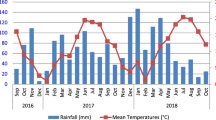Abstract
THE bovine habit of not eating grass growing in the vicinity of bovine fæces has been the subject of occasional speculative writing, which has discussed the supposed value of such behaviour in protecting the animal from parasitism. A recent study of the free-living stages of the cattle lungworm1 suggested that, in order to ingest the larvæ, the bovine host had to ingest bovine fæces. An investigation into certain aspects of grazing behaviour appeared to be warranted, and as a first step observations were made to determine whether by virtue of its apparently selective pattern of grazing the bovine did indeed ingest fewer larvæ than it would if its grazing were entirely at random.
Similar content being viewed by others
References
Michel, J. F., and Rose, J. H., J. Comp. Path., 64, 195 (1954).
Author information
Authors and Affiliations
Rights and permissions
About this article
Cite this article
MICHEL, J. Parasitological Significance of Bovine Grazing Behaviour. Nature 175, 1088–1089 (1955). https://doi.org/10.1038/1751088a0
Issue Date:
DOI: https://doi.org/10.1038/1751088a0
- Springer Nature Limited
This article is cited by
-
Caenorhabditis elegans exhibit a coupling between the defecation motor program and directed locomotion
Scientific Reports (2015)





